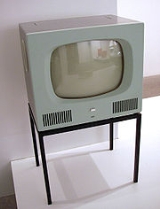|
1925
|
|
10.2.1925
John Logie Baird performs the first test of a working television system.
|
|
|
1927
|
|
9.7.1927
The first fully electronic television system is achieved by Philo Taylor Farnsworth.
|
|
|
1928
|
|
2.25.1928
Charles Jenkins Laboratories of Washington, D.C. becomes the first holder of a television license from the Federal Radio Commission. |
|
|
1947
|
|
11.6.1947
''Meet the Press'' makes its television debut (the show went to a weekly schedule on September 12, 1948).
|
|
|
1948
|
|
8.10.1948
''Candid Camera'' makes its television debut after being on radio for a year as ''Candid Microphone''. |
|
|
1949
|
|
1.17.1949
''The Goldbergs'', the first sitcom on American television, first airs.
|
|
4.5.1949
Fireside Theater debuts on television.
|
|
12.29.1949
KC2XAK of Bridgeport, Connecticut becomes the first Ultra high frequency (UHF) television station to operate a daily schedule.
|
|
|
1950
|
|
|
1951
|
|
9.4.1951
The first live transcontinental television broadcast takes place in San Francisco, California, from the Japanese Peace Treaty Conference. |
|
|
1953
|
|
1.19.1953
68% of all television sets in the United States are tuned in to ''I Love Lucy'' to watch Lucy give birth.
|
|
|
1954
|
|
7.5.1954
The BBC broadcasts its first television news bulletin. |
|
|
1955
|
|
12.10.1955
The Mighty Mouse Playhouse premieres on television.
|
|
|
1956
|
|
9.17.1956
Television is first broadcast in Australia. |
|
|
1957
|
|
2.16.1957
The "Toddlers' Truce", a controversial television close down between 6.00pm and 7.00pm is abolished in the United Kingdom. |
|
|
1958
|
|
|
1960
|
|
|
1962
|
|
7.11.1962
First transatlantic satellite television transmission. |
|
7.23.1962
Telstar relays the first publicly transmitted, live trans- Atlantic television program, featuring Walter Cronkite. |
|
|
1963
|
|
9.2.1963
''CBS Evening News'' becomes U.S. network television's first half-hour weeknight news broadcast, when the show is lengthened from 15 to 30 minutes. |
|
|
1965
|
|
3.24.1965
NASA spacecraft Ranger 9, equipped to convert its signals into a form suitable for showing on domestic television, brings images of the Moon into ordinary homes before crash landing.
|
|
|
1969
|
|
11.3.1969
Vietnam War: U.S. President Richard M. Nixon addresses the nation on television and radio, asking the "silent majority" to join him in solidarity on the Vietnam War effort and to support his policies. |
|
11.10.1969
National Educational Television (the predecessor to the Public Broadcasting Service) in the United States debuts the children's television program ''Sesame Street''. |
|
|
1970
|
|
4.1.1970
President Richard Nixon signs the Public Health Cigarette Smoking Act into law, requiring the Surgeon General's warnings on tobacco products and banning cigarette advertisements on television and radio in the United States, starting on January 1, 1971. |
|
|
1971
|
|
|
1975
|
|
|
1981
|
|
7.27.1981
British television: on ''Coronation Street'', Ken Barlow marries Deirdre Langton, which proves to be a national event scoring massive viewer numbers for the show.
|
|
|
1986
|
|
7.18.1986
A tornado is broadcast live on KARE television in Minnesota when the station's helicopter pilot makes a chance encounter. |
|
|
1987
|
|
1.22.1987
Pennsylvania politician R. Budd Dwyer shoots and kills himself at a press conference on live national television, leading to debates on boundaries in journalism.
|
|
|
1997
|
|
3.13.1997
The Phoenix lights are seen over Phoenix, Arizona by hundreds of people, and by millions on television.
|
|


